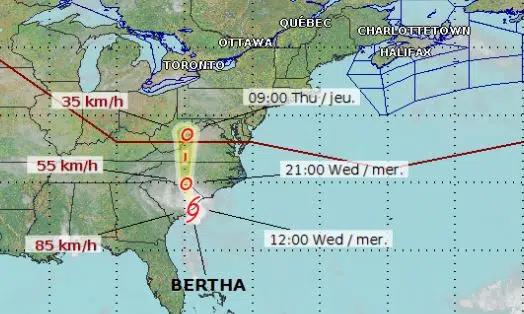
A map of the projected path of Tropical Storm Bertha from May 27, 2020. Photo: Canadian Hurricane Centre.
The Atlantic coast is getting an early preview of what could be an active hurricane season as Tropical Storm Bertha makes its way toward the Carolinas.
Bertha is unlikely to reach Atlantic Canada according to Environment Canada meteorologist Ian Hubbard.
“Once it makes landfall, which we expect to happen near Charleston, it will begin to lose power and we expect it to disappear within 36 hours,” Hubbard said in an interview Wednesday.
The first named tropical storm, and the stronger of the two, was named Arthur though it never made landfall.
Bertha was named Wednesday morning when it was upgraded to tropical storm status. For a tropical storm to qualify for a name it must have winds in excess of 64 km per hour. Atlantic storms are only upgraded to hurricanes if they surpass sustained wind speeds of 119 km per hour.
Earlier this month, The Canadian Hurricane Centre released it’s projections for this year’s hurricane season — forecasting between one and eight more named storms more than the seasonal average.
This year marks the sixth year in a row where named storms have appeared in the Atlantic during the hurricane pre-season, (May) though Hubbard adds people should not read too much into these early storms as early season named storms are typical.
Bertha has also garnered the attention of NASA and SpaceX who are planning to launch two astronauts aboard their Falcon9 rocket Wednesday evening. The space agencies are still preparing so the launch can go ahead, adding they’re prepared to call it off should Bertha shift trajectories.








